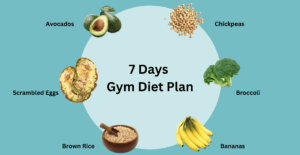Hitting the gym regularly is a fantastic way to improve your overall health and fitness. But to truly optimize your efforts and see the results you desire, a well-balanced diet is crucial. Delves into the world of gym diet plans, providing you with the knowledge and insights to create a personalized plan that aligns with your fitness goals and individual needs.
Understanding Macronutrients:
Before diving into specific plans, it’s essential to understand the fundamental building blocks of a healthy diet: macronutrients. These include carbohydrates, protein, and fat, each vital in supporting your body during exercise and recovery.
- Carbohydrates: These provide readily available energy for your workouts. Complex carbohydrates in whole grains, fruits, and vegetables are preferred over simple carbohydrates like sugary drinks and refined grains.
- Protein is essential for building and repairing muscle tissue. Lean protein sources like chicken, fish, beans, and lentils are crucial for muscle growth and recovery.
- Healthy fats are vital in hormone production, cell function, and satiety. Sources like avocado, nuts, and seeds should be incorporated in moderation.
Tailoring the Plan to Your Goals:
There’s no one-size-fits-all gym diet plan. The ideal approach depends on your specific fitness goals:
- Muscle Building: Focus on a moderate protein intake (around 1-1.5 grams per kilogram of body weight) to support muscle growth, sufficient complex carbs for energy, and healthy fats for overall well-being.
- Fat Loss: Prioritize a calorie deficit, meaning consuming fewer calories than you burn. Maintain a moderate protein intake for muscle preservation, and prioritize complex carbs and healthy fats to keep you full and support overall health.
- Maintaining Muscle Mass: Aim for a balanced intake of all three macronutrients, ensuring your body receives the necessary nutrients to maintain muscle mass and overall health.

Sample Meal Plan:
Here’s a sample meal plan illustrating how the principles mentioned above can be applied:
- Breakfast: Oatmeal with berries and nuts (carbs, protein, healthy fats)
- Mid-morning Snack: Greek yogurt with fruit and granola (protein, carbs, healthy fats)
- Lunch: Grilled chicken breast with brown rice and roasted vegetables (protein, carbs, healthy fats)
- Afternoon Snack: Apple slices with almond butter (carbs, protein, healthy fats)
- Dinner: Salmon with quinoa and steamed broccoli (protein, carbs, healthy fats)
Additional Tips:
- Stay Hydrated: To support and maximize your body’s processes, sip on lots of water throughout the day.
- Focus on Whole Foods: Prioritize whole, unprocessed foods over processed options for optimal nutrient intake.
- Read Food Labels: Be mindful of portion sizes and sugar content when consuming packaged foods.
- Listen to Your Body: Adjust your calorie intake and macronutrient ratios based on your needs and hunger cues.
- Seek Professional Guidance: Consult a registered dietitian or certified nutritionist if you have specific dietary needs or require personalized guidance.
Conclusion:
Creating a sustainable gym diet plan requires understanding your needs and tailoring your macronutrient intake to your fitness goals. Remember, consistency is critical. By making informed choices and adopting healthy eating habits, you can fuel your workouts effectively and achieve your desired fitness results.
